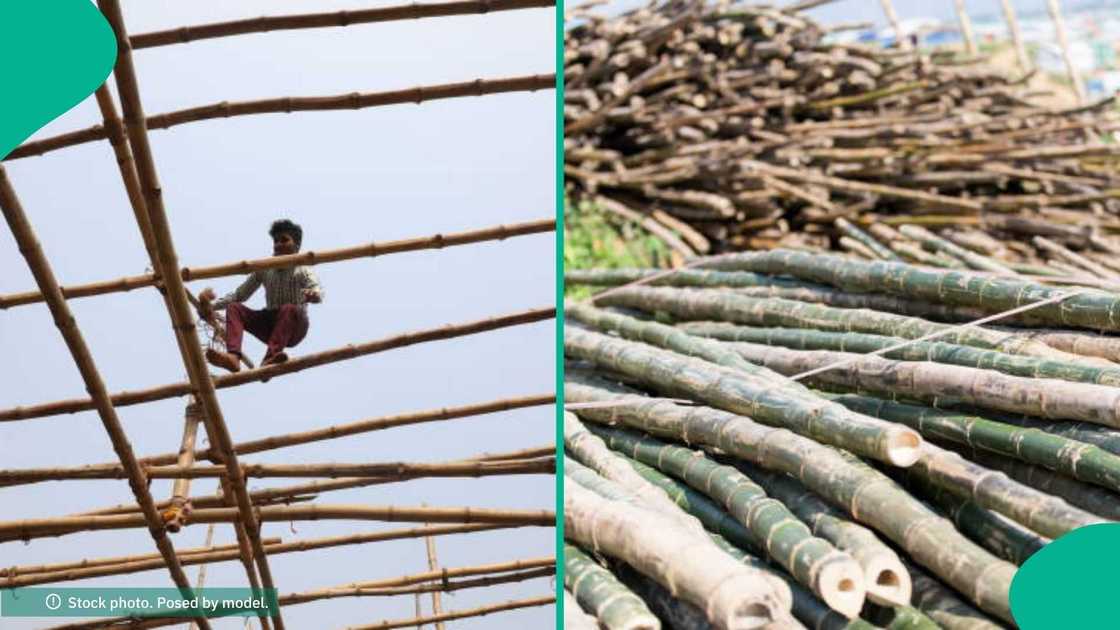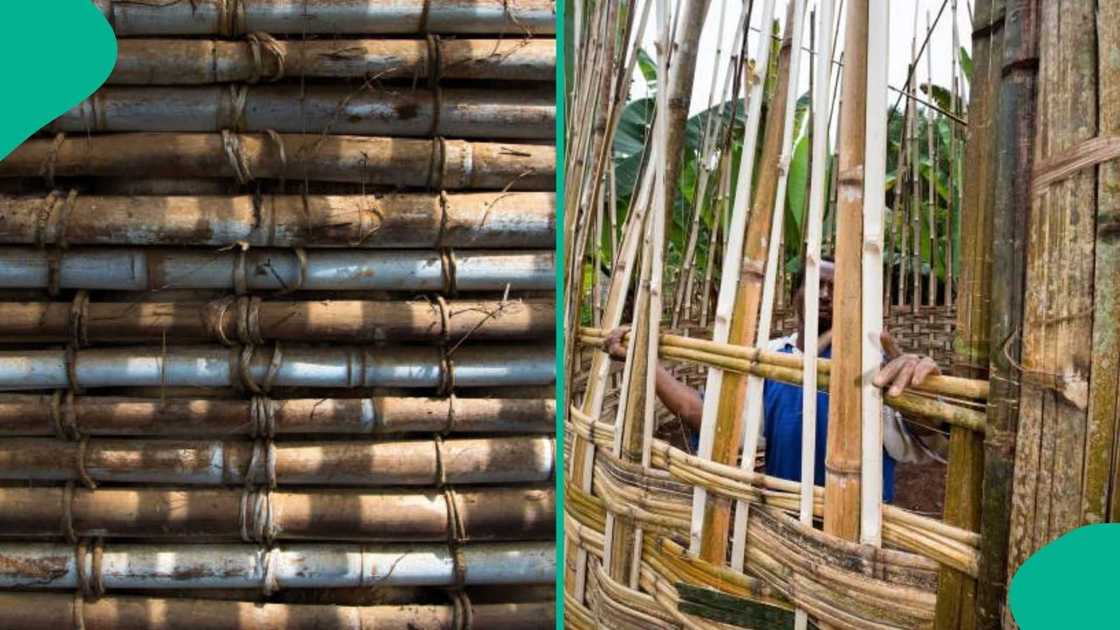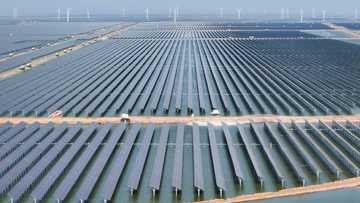Nigeria’s Bamboo Gamble Amid Soaring Construction Costs, by Jennifer Odii
Editor’s note: In this piece, real estate expert Jennifer Odii questions Nigeria’s bamboo housing move, pointing to gaps in infrastructure, policy, and market readiness that could undermine its promise of affordability and sustainability.
Nigeria's construction sector is grappling with a profound crisis, driven by the trio pressures of persistent hyperinflation, import dependency, and the precipitous devaluation of the naira. This economic volatility has unleashed an unprecedented surge in the cost of building materials—from cement and iron rods to critical finishing components, turning even the most modest building project into a burdensome endeavor. Rent is skyrocketing. Homeownership, once a middle-class aspiration, now teeters on the edge of fantasy in a country where millions remain homeless or trapped in slum housing conditions.

Source: Getty Images
Into this chaos steps a surprising policy proposition: bamboo.
On June 11, 2025, Nigeria’s federal government officials announced that Nigeria will now pursue the use of only bamboo plants to construct “affordable and durable smart houses” for low- and middle-income earners. The announcement touted bamboo as the silver bullet for Nigeria’s worsening housing and climate crisis

Read also
Dangote refinery clears air, reacts to claims that its distribution plan will create job loss
Meanwhile, Nigeria's housing challenges dwárf the following realities: an estimated 28 million housing deficit, with over 70% of the urban population residing in informal settlements characterized by limited coverage of urban services, dire overcrowding, slum housing conditions, lack of sanitation, and pervasive health risks. Millions more face chronic precarity, living in dilapidated structures vulnerable to collapse, constant quit notices, further fueling social instability and hindering human development on a vast scale.
Let’s pause here for a second. The spirit of innovation is laudable. But declarations alone don’t build houses.
The good, the bad, and the bamboo
To be clear, bamboo is an incredible natural resource. Often called "green gold, it grows fast, absorbs carbon at four times the rate of most trees, and, when processed correctly, can serve as a strong, flexible, and renewable material for lightweight construction. Its tensile strength rivals that of steel, and countries like India, Vietnam, and even parts of Latin America have experimented with bamboo housing, especially in climate-vulnerable zones.
So, on paper, the move appears green, cost-sensitive, and forward-thinking. But Nigeria isn’t operating on paper. It is battling a brutal economic storm where over 133 million people live in multidimensional poverty. Bamboo cannot become a Band-Aid for structural failure.
The fivefold cracks in the foundation
- Raw material hype vs. supply reality: Bamboo grows in Nigeria, but not at the scale or quality required for industrialized housing. Creating a bamboo-based construction industry will require investment in plantations, processing plants, curing facilities, and logistics—none of which currently exist at a national scale. Who will fund this green ecosystem ambition?
- Durability and standards: Bamboo is vulnerable to pests, humidity, and fire without proper treatment. Safety cannot be assumed—it must be guaranteed. Where is the Nigerian Standard Organization’s input on national specifications for bamboo housing materials? How will the government ensure these bamboo homes are safe, especially in flood- or heat-prone areas
- Affordability fallacy: It’s seduct!ve to believe that swapping one raw material for another will automatically cut final housing costs. Construction is a value chain—land, labor, logistics, regulatory approvals, and finance still shape affordability. Without systemic reform, “bamboo smart homes” could end up being as expensive as conventional homes unless the entire housing value chain is restructured.
- One-size-fits-all thinking: Nigeria is not a single market. A bamboo house might make sense in humid Cross River, but be structurally unsuited for arid Sokoto or windy Jos. Architecture must reflect context, climate, and culture. A singular material policy ignores regional realities.
- Greenwashing risk: There’s a thin line between innovation and optics. Announcing bamboo homes while ignoring the broader policy gaps in land reform, mortgage systems, local manufacturing, and infrastructure development risks turning this into a green publicity stunt. We cannot decarbonize poverty.

Source: Getty Images
Beyond optics: From announcement to execution
If the federal government is serious about transforming bamboo from buzzword to building block, here’s what needs to happen—urgently:
- Pilot and proof: Don’t talk, do it! Build 10–20 model bamboo smart homes across different ecological zones. Let Nigerians see, live in, and evaluate them. Public-private partnerships, especially with research institutions and local builders, should be part of this pilot.
- Local industrial investment: Invest in processing infrastructure. Bamboo construction requires chemical treatment, thermal modification, and engineered panels. We need a manufacturing base, not just raw bamboo in villages.
- Legal & regulatory frameworks: Set up enforceable national standards, building codes, and inspection systems specific to bamboo construction. Safety and trust are prerequisites to adoption.
- Finance & mortgage innovation: Even if homes are made from grass or gold, if people cannot access low-interest mortgages or cooperative housing finance, affordability is a mirage.
- Community buy-in: From urban Lagos to rural Gombe, sensitize communities to the benefits and limitations of bamboo-based living. Innovation without communication is doomed to fail.
A bamboo gamble worth watching
The truth is: bamboo alone won’t fix Nigeria’s housing crisis. The bigger opportunity lies in rethinking construction from the ground up. That means developing local material value chains (like clay, earth blocks, volcanic ash cement), deploying modular construction systems, investing in rural housing schemes to curb urban migration, and implementing predictive housing policy that forecasts demographic pressures, not just reacts to them.
This policy move is not wrong—it’s just dangerously incomplete.
We cannot greenwash our way out of a concrete crisis. What we need are bold, data-driven, multidimensional reforms that match the scale of our housing emergency. Innovation must walk hand-in-hand with infrastructure. Sustainability must be tied to scalability. And vision must be rooted in realism.
If not, the bamboo gamble may not pay off, and we will continue to dream in green, while our cities crumble under the weight of unmet promises.
Jennifer Odii is an entrepreneur, and founder of Real Estate Stakeholders Support Initiative where she champions women’s leadership in the real estate industry, a traditionally male-dominated sector. She designs systems where real estate, dining, and design become catalysts for sustainable growth. She writes from Port Harcourt, Nigeria. Email: officialodiijennifer@gmail.com.
Disclaimer: The views and opinions expressed here are those of the author and do not necessarily reflect the official policy or position of Legit.ng.
Source: Legit.ng





